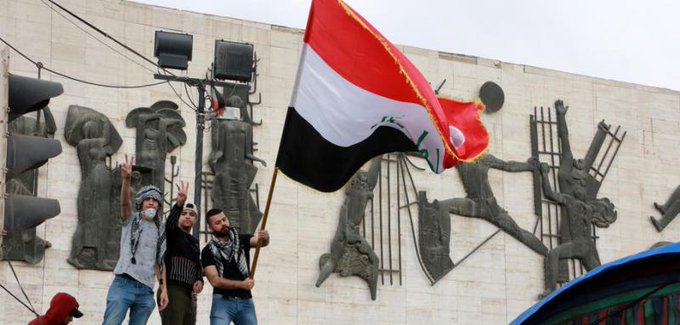IRAQ IS A FAILED STATE

IRAQ IS A FAILED STATE UNDER THE IRANIAN JACKBOOT
The rocket attack on 11th March that killed a young Scottish female medic – Lance Corporal Brodie Gillon – and two Americans in Iraq, has raised once more the spectre of resurgent Iranian aggression in the region. The 26-year-old British reservist had volunteered for a deployment in Iraq. She was killed when 18 Katyusha rockets struck Camp Taji where she was stationed, 25 miles north of Baghdad. A further fourteen military personnel were wounded in the unprovoked attack. The US Secretary of State, Mike Pompeo, quickly identified that the rockets had been fired by members of an Iranian-backed Shi’ia militia, Kataib Hezbollah, part of al-Hashd al-Shaabi, the so-called popular mobilization forces. The Pentagon ordered retaliatory airstrikes against one of the Kataib Hezbollah bases, killing several insurgents.
Al-Hashd al-Shaabi and Kataib Hezbollah have been itching to strike out against British and American troops in Iraq since their hero, General Qasem Soleimani and their leader, Abu Mehdi Mohandes, were killed by an American drone strike at Baghdad Airport on 3rdJanuary. Soleimani was head of the Quds Force, the extra-territorial wing of the Iranian Islamic Revolutionary Guards Corps, Iran’s Gestapo, a listed terrorist organisation. He was one of the most vicious criminals in Iran’s history. Pretending to aid the West in their war against ISIS, Soleimani oversaw the genocidal massacre of hundreds of thousands of Iraqi Sunnis in the ancient cities of Fallujah, Ramadi and Mosul, leaving smoking ruins in his wake. The night he was killed, he had arrived in Baghdad to meet Mohandes, the al-Hashd al-Shaabi boss, to supervise a further crackdown on popular protests and demonstrations that had continued on the streets of Iraq’s main cities for months. Boasting that “We know how to deal with protesters in Iran”, Soleimani had instructed his Iranian proxies to use live ammunition in a shoot to kill strategy. His lethal approach had already led to the murder of over 1,500 unarmed protesters during a nationwide uprising that raged in Iran last November.
Anti-government protests have gripped Iraq’s main towns and cities since last October and by the turn of the year, under Soleimani’s instructions, black clad and masked Shi’ia militia snipers firing from the roofs of government buildings had killed 500, mostly young Iraqi protesters. More than 15,000 were injured. Since Soleimani’s death in January, Iraqi thugs have been using shotguns to fire at peaceful protesters, causing horrific injuries. The UN Assistance Mission in Iraq said they have evidence of at least 50 people injured by birdshot in this way. Jeanine Hennis-Plasschaert, the Special Representative of the UN Secretary General for Iraq, condemned the violence saying: “The continued pattern of the use of excessive force, with ambiguously identified armed groups and unclear loyalties, is a grave security concern that must be tackled urgently and decisively. Peaceful protesters should be protected at all times.” Despite her warnings, nine people were wounded on Monday in Baghdad during renewed clashes between protesters and the security forces. Two were wounded by birdshot and the rest suffered tear gas-related injuries.
The nationwide uprising in Iraq has consistently blamed government incompetence and corruption and the ruling elite’s slavish subservience to the Iranian regime, for the country’s broken economy and security breakdown. The former Prime Minister, Adil Abdul-Mahdi, seen as a crooked puppet of the Iranian mullahs, was forced to resign last November. He was replaced by Mohammed Allawi, a former communications minister, who was named as Prime Minister designate in February, but this led to an upsurge of street protests with thousands claiming that Allawi was simply another corrupt stooge of the Iranian regime. Allawi’s attempts to form a new government were repeatedly rejected and he withdrew his nomination for the job of Prime Minister this month. Iraq’s President, Barham Saleh, has now named Adnan al-Zurfi, former governor of the city of Najaf, as Prime Minister designate and he has 30 days, under the Iraqi constitution, to form a new government. Iran’s National Security Council secretary Ali Shamkhani has, for the past two weeks, been in Baghdad, helping to steer this process, while also seeking to consolidate Iranian control over al-Hashd paramilitary factions, while agitating for the eviction of US forces.
Iraq has suffered months of in-fighting between the various political blocs and continuing street protests from a population fed up with institutionalized corruption and Iranian meddling in Iraq’s internal affairs. Protesters have encamped in Baghdad’s Tahrir Square since October, demanding new elections to sweep out the venally corrupt political elite and replace them with independent technocrats who can start the process of rebuilding Iraq’s devastated cities and wrecked economy, free of all interference from Iran’s theocratic, fascist regime.
One of the key political figures attempting to maintain Iranian influence in Iraq is the rabid anti-American Iraqi cleric Muqtada al-Sadr. He has recently done a u-turn on his previous support for the protesters, by sending in his own private Shi’ia militia to crush the demonstrations. This has increased his patronage by the Iranian regime and made him the king-maker in the choice of Prime Minister. With the Iranian mullahs insisting on a Shi’ite succession in their client-state, it seems unlikely that the minority Sunni and Kurdish population of Iraq will see any improvements in their affairs.
So, Iraq’s future as a failed state, governed by corrupt Shi’ia warlords who take their orders from Tehran, looks set to continue indefinitely. The surge in deaths from the Coronavirus has added a further complication to the spiralling downfall of this once prosperous country. As US troops prepare to pull out of three of their military bases following intensified rocket attacks and escalating tensions with Baghdad and Tehran, the only winner is Iran. The mullahs’ policy of aggressive expansionism across the Middle East seems to be succeeding.
